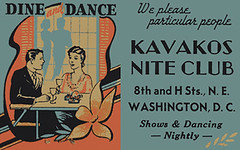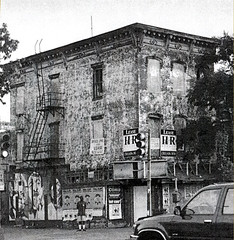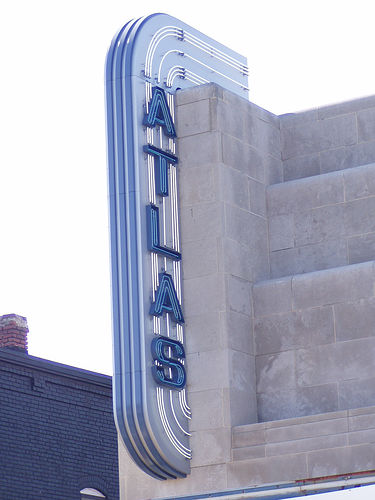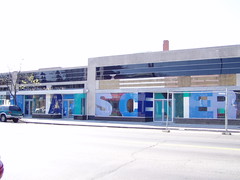Civic Tourism
I have written plenty about the links between historic preservation, commercial district revitalization, arts and cultural development, and tourism.
Some of this I wrote in the context of the failure of the City Museum in DC., in a blog entry in July, "Who ♥ DC? -- More about DC tourism," and another blog entry from February, "Town-City branding or 'We are all destination managers now'" also covers this topic.
I bring this up for two reasons. One because I attended a workshop yesterday, sponsored by the Humanities Council of Washington DC, about community history. I have some problems with my perceptions of some of the emphasis right now, because it can be a fine line in "community history" between collecting, codifying, and communicating history versus history as a kind of self-validation exercise. Both are important, but I don't think we can have a "city of learning" if we focus strictly on the self-validation piece.
And I think that it can be a danger if we focus on history as validation rather than getting off our butts and ensuring that we preserve more buildings and neighborhoods rather than lose more and more architectural and cultural resources to demolition.
Relatedly, a problem that can occur with validation concerns whose history is to be primary. I run into this in the context of H Street NE all the time. For example, the Club Kavakos, for many years, was a segregated place open only to whites. I know of a woman in the neighborhood, who attempted to take a soldier going off to war for a "night on the town," and was turned away. More than 60 years later, that memory still bristles, and she doesn't care at all that the building was torn down.
On the other hand, I know another African-American woman, who as a young adult in the 1950s worked on H Street, and played on H Street at night--by going to the same CoCo Club that had been barred to African-Americans in the previous decade. She regrets that the building is gone, and treasures the memories she has of the good times she spent there. Is one history "more correct" or more deserving of "preservation" than the other?
My take is to save all our histories, and interpret them honestly.
 Matchbook cover, Kavakos Club, image courtesy of Peter Sefton.
Matchbook cover, Kavakos Club, image courtesy of Peter Sefton. Kavakos Club building, before it was demolished, illegally, in 1999, by the H Street Community Development Corporation. Photo by Mary Farrell.
Kavakos Club building, before it was demolished, illegally, in 1999, by the H Street Community Development Corporation. Photo by Mary Farrell.
 The Atlas Theater, now the Atlas Performing Arts Center, on H Street NE is a neighborhood cultural asset that was not demolished, but instead was rehabilitated to serve the neighborhood and the city for a new century. Atlas photos by Elise Bernard.
The Atlas Theater, now the Atlas Performing Arts Center, on H Street NE is a neighborhood cultural asset that was not demolished, but instead was rehabilitated to serve the neighborhood and the city for a new century. Atlas photos by Elise Bernard.On the hand, you can understand people's focus on validation given the perception of an overly dominant "product development" focus of heritage tourism efforts in the city thus far. I am not too critical of this, because an "economic development" focus can be used to garner money from the powers that be. But the city lacks a comprehensive approach, as I discussed in the two blog entries referenced earlier--and without a comprehensive approach, it is all too easy to overlook the non-economic development aspects of local history and heritage.
Regardless, not all aspects of local history need to be "commodified." There is value to history and place independent of its ability to attract visitors and their spending. Fortunately, if we make great places for ourselves, usually such places are attractive and marketable to others. I do feel that many people, justifiably, are concerned that many local efforts are more about making great places attractive to others, rather than to those of us already here.
Second, the State of Arizona seems to have codified the threads that I discussed earlier--historic preservation and tourism--into a statewide planning effort that they call Civic Tourism. They define it thusly:
Civic Tourism is an extension of other "place-based" approaches that have been practiced for decades, such as cultural tourism, heritage tourism, ecotourism, and geotourism. Civic Tourism seeks to provide a forum for communities to decide if and how the individual ingredients of "place" (cultural, built, and natural) can be integrated to create an appealing, dynamic, and distinctive community identity. In that sense the focus is product development, not destination marketing.
I have added a link to this website under the tourism resources section in the right sidebar. There are a number of resources on the website, from a bibliography which looks good, as well as principles:
Think Outrageously.
Beyond economic development, communities can use tourism as a tool to enhance quality of life.
Rethink Economics
The so-called Creative Economy seems to dismiss tourism, but it shouldn’t.
Invest in the Product
By investing in "place" conceptually and financially, towns can create an appealing tourism product.
Connect to the Public
Communities need to extend and reframe the conversation about tourism development.
And the website lists a conference in March that sounds pretty interesting...
The Civic Tourism conference seeks to identify appropriate and feasible ways to combine: theory and practice; resident and visitor perceptions of "place;" sustainability and economic development; and tourism development and community building. Presenters are divided into four content areas:
Sense of Place: This category includes researchers who focus on the subject of "place," conceptually and historically. One conference goal is to link theories of place to responsible tourism practices.
Tourism Management: This group features practitioners of existing programs that incorporate concepts central to Civic Tourism, such as "using" tourism as a tool for building healthy communities.
Tourism Trends: This category includes theorists breaking new ground in place-based tourism and economic development — suggesting methods and outcomes that are outside the usual approaches.
Public Voice: Civic Tourism’s central premise is that we need a new kind of public converation about tourism, not the usual pro/con debate (pro: tourism provides jobs; con: tourism ruins towns). This unit includes presenters who will review strategies for civic engagement within a tourism context.
_________
One of the concerns expressed by a friend is that "cultural tourism" is often focused on historic assets, and less on the arts and culture of today. I think that's a legitimate criticism.
I think there is an even better term than "Civic Tourism" although I don't know yet what it is...but something along the lines of the Project for Public Space's focus on creating great places.



1 Comments:
The relevance of your approach calling for holistic education that does not see a “city of learning” as focusing on self-validation alone but instead looking at the bigger picture cannot be overlooked. It is important to find a balance between being proud of one’s past and adopting an inclusive approach that takes into account different viewpoints and encourages continuous learning in order to develop sustainable communities.
On a different note, have you thought about checking out Gymdolphin Coupon Codes for potential savings on sportswear or accessories as you engage with the complex industry of community development and learning? Perhaps this will be a smart way to integrate fashion with social health.
Post a Comment
<< Home